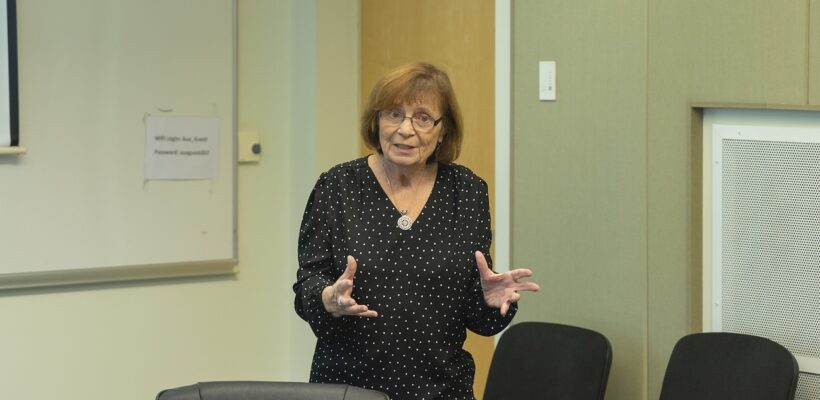
AUA Faculty Discuss Encouraging Civic Engagement Through Education
2 min readYEREVAN, Armenia — On Friday, April 26, Dr. Karen Kashmanian Oates, director of Worcester Polytechnic Institute’s Master of Science in Global Health program and former Peterson Family Dean of Arts and Sciences, led a discussion with American University of Armenia (AUA) faculty on promoting civic engagement through active learning in the classroom.
The discussion was organized by AUA’s General Education department to highlight the importance of the University’s undergraduate degree in developing articulate, conscientious citizens and problem solvers who are committed to contributing to their fields and society and providing students with a broad foundation of knowledge, skills, and perspectives.
The objectives of civic engagement include authentic problem solving, understanding the complex interactions of theory and social outcomes, teamwork and leadership, ethical and diversity awareness, and working through controversy with civility. “By acting on the responsibility to their communities, students become empowered agents of positive change for an inclusive, more democratic society,” remarked Dr. Oates.
Dr. Oates emphasized that as agents of change, colleges and universities should “teach not just to share content, but also to help students put knowledge into action.” She further noted that “we cannot afford to invest in educating a generation that merely acquires knowledge without understanding how to put knowledge into practice to benefit society, our communities, and our nations.”
Discussing the importance of linking course content to what is interesting, important, and meaningful to students, Dr. Oates shared that when she teaches cell biology for non-major students, the course is titled Cancer. The content is the same, but the link to students’ lives and experiences is real.
Dr. Oates further noted that civic engagement should not be confined to a general or liberal education, because “an embedded goal of science and engineering is to support our democratic practices.” She stressed that doing so requires a “form following function” approach and “if we want engagement as the result of our work, then we must engage our students in authentic, relevant, challenging, and meaningful learning.” She further noted that engaging students in authentic learning can be done by embedding into courses projects through which students engage with community organizations to address tangible, local problems; work with children in the community; and design and implement high-impact neighborhood improvement projects.
Faculty from across the University participated in the discussion, sharing ideas, strategies and challenges.
Dr. Oates is in Armenia leading a group of 15 WPI and eight AUA students in community-based projects, as part of AUA’s partnership with WPI. Before joining WPI, she was the deputy director for undergraduate education at the National Science Foundation. She was the founding provost at Harrisburg University of Science and Technology and an associate dean and director at George Mason University. She has conducted faculty development workshops on topics including progressive pedagogical approaches to support learning, assessment strategies, and discovery-based undergraduate research, as well as using research on how people learn to inform curricular design. She served as a Eurasia Specialist with the United States Agency for International Development/Higher Education for Development and has participated in several global research and education initiatives.
Founded in 1991, the American University of Armenia (AUA) is a private, independent university located in Yerevan, Armenia, affiliated with the University of California, and accredited by the WASC Senior College and University Commission in the United States. AUA provides local and international students with Western-style education through top-quality undergraduate and graduate degree and certificate programs, promotes research and innovation, encourages civic engagement and community service, and fosters democratic values.



